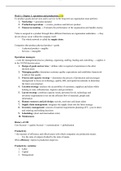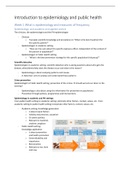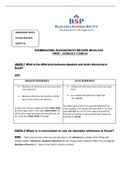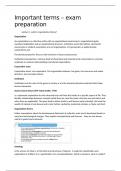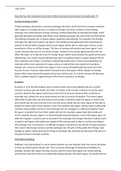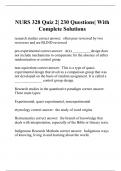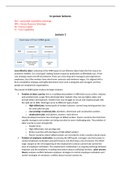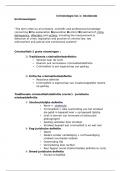Public International Law | LLB International and European Law | Year 2 | Block 2
Lecture 1: State Jurisdiction
Territorial Sovereignty
● Exercise of CONTROL over territory and persons.
○ Access to territory is essential to exert control over it.
○ Removal from territory (banishment, deportation, extradition = allows transfer of
person suspected / convicted from one state to the other, in order to bring them
to justice)
● If you have certain obligations under international laws, those have priority over other
laws – they must be followed first, also within one's territorial control.
Jurisdiction
● 3 main types / forms of jurisdiction exist:
○ Prescriptive = legislature creates laws.
○ Enforcement = enforcing certain laws or decisions on persons outside of the
state. Often states create specific laws that they know will be enforceable
■ E.g of issue where it is complex; child abduction over
○ Adjudicative = courts and judges; adjudicative bodies hear and determine
individual cases on questions of law.
Territorial and Extraterritorial jurisdiction
● Territorial = land that you control, land mass, but also internal waters (within landmass),
and 12 nautical miles past the coast. Territorial waters. (measures at maximum tide line)
it is UP TO 12 nautical miles, so not necessarily 12 for each state.
● Extraterritorial = sort of part of passive personality / nationality principle.
SS Lotus Case
● When is a state allowed to exercise jurisdiction?
● Presented as ‘you are allowed to do, unless there is a specific prohibition disallowing you
from taking that specific action’ by the ICJ.
● Para 44: Restrictions cannot be PRESUMED.
● Burden of proof (41-42):
○ France: Turkey must prove some title of jurisdiction.
○ Turkey: NO, France must prove that there was a violation of them taking
jurisdiction.
○ Special agreement: whether turkey has acted contrary to a principle of
international law
○ ICJ: if it is not prohibited, it is allowed. Thus, states create state practice by
acting, but also by omission — choosing not to act because they feel they have
an obligation not to as though there were laws in place saying so.
, Territorial principle
● Territorial sovereignty = embodies a general competence.
● Subjective TP → for the victim of the crime, that's the state with jurisdiction.
● Objective TP → for the person that committed the crime, that's the state with
jurisdiction.
● Effects Doctrine → effects within the territory means that that company has jurisdiction
○ E.g. US sanctions against companies involved with Nord Stream 2, which would
affect gas availability in the USA.
● How is nationality determined? → Nottebohm case (lack of nationality / multiple
nationalities):
○ A German national decided to go to Guatemala, lived there for several decades,
had a business there (early 1900s). Towards mid 1930s, went to Liechtenstein
and got that nationality too.
○ Guatemala was seizing the property of German nationals, but he was also a
Liechtenstein citizen. Thus that state had the power to exercise diplomatic
protection over him.
■ NOTE: diplomatic protection is protection afforded to diplomats, but
HERE it's a state’s power in international court to choose to invoke
the rights that have allegedly been violated against one of their
nationals. It is a matter of invoking the right on the behalf of the
individual, since they themselves do not have that standing in
international court.
○ On the basis of diplomatic protection, they declared the German’s rights to be
violated.
○ Main rule: Each state makes their own decision on who to give their nationality to.
If you have two citizenships, your love / connection determines a genuine link
with one of the nationalities (when there’s a clash in such diplomatic protection
issues). E.g. where your family is, what you have greatest ties to (I PRESUME
through both a legal and factual lens).
Principles of Criminal Jurisdiction
Flag Principle
● Flag principle = the flag state (ie, the state where the boat is registered) has a form of
jurisdiction over crimes committed on boats / ships of their flag / nationality.
○ Ships are NOT the territory of the state; a better way to consider them is as
nationals of the flag state.
○ Flags of convenience; small states tend to have lots of ships registered, because
of tax purposes / better tax conditions.
○ A similar principle applies to aircraft as well — jurisdiction goes to the state of
registration of the plane that the crime occurred on.
■ Ships have flag states; airplanes have states of registration.
■ Floating / flying territory – see Hernandez, 216.

